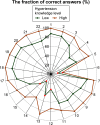Relationship between patients' knowledge and medication adherence among patients with hypertension
- PMID: 27994443
- PMCID: PMC5153315
- DOI: 10.2147/PPA.S117269
Relationship between patients' knowledge and medication adherence among patients with hypertension
Abstract
Objective: The purpose of this study was to investigate the relationship between knowledge on arterial hypertension (AH) and its management, and adherence to pharmaceutical treatment.
Methods: The study included 233 patients diagnosed with AH and treated with hypotensive drugs for at least 1 year. The 8-item © Morisky Medication Adherence Scale (MMAS-8) and the Hypertension Knowledge-Level Scale (HK-LS) were used.
Results: Sixty-three percent of the patients had a low level of knowledge on AH, with the smallest proportion of correct answers provided for items related to non-pharmaceutical treatment, diet, hypertension definition, and drug adherence. When compared to patients with a high level of knowledge, those with a low knowledge had lower scores in the MMAS (6.45±1.45 vs 7.08±1.04; P=0.038). Multiple-factor analysis showed that statistically significant independent determinants of good adherence included a high level of knowledge (β=0.208; P=0.001), non-pharmaceutical treatment (β=0.182; P=0.006), and frequent blood pressure measurements (β=0.183; P=0.004). The most significant factor in MMAS was knowledge in the "drug adherence" domain (ρ=0.303; P<0.001).
Conclusion: Patients' knowledge on hypertension is a significant independent determinant of good adherence. Other independent determinants include non-pharmaceutical treatment and regular blood pressure measurements.
Implication for practice: The identification of knowledge deficits as a factor contributing to lack of adherence and poor hypertension control remains a key challenge for multidisciplinary team caring for patients with hypertension.
Keywords: arterial hypertension; medical knowledge; medication adherence.
Conflict of interest statement
The authors report no conflicts of interest in this work.
Figures



Similar articles
-
Psychometric evaluation of a Korean version of the 8-item Medication Adherence Scale in rural older adults with hypertension.Aust J Rural Health. 2013 Dec;21(6):336-42. doi: 10.1111/ajr.12070. Aust J Rural Health. 2013. PMID: 24299439
-
Validation of the Persian Version of the 8-Item Morisky Medication Adherence Scale (MMAS-8) in Iranian Hypertensive Patients.Glob J Health Sci. 2015 Jan 1;7(4):173-83. doi: 10.5539/gjhs.v7n4p173. Glob J Health Sci. 2015. PMID: 25946926 Free PMC article.
-
Psychometric properties of the Osteoporosis-specific Morisky Medication Adherence Scale in postmenopausal women with osteoporosis newly treated with bisphosphonates.Ann Pharmacother. 2012 May;46(5):659-70. doi: 10.1345/aph.1Q652. Epub 2012 Apr 17. Ann Pharmacother. 2012. PMID: 22510666
-
Self-Reported Medication Adherence Measured With Morisky Medication Adherence Scales and Its Determinants in Hypertensive Patients Aged ≥60 Years: A Systematic Review and Meta-Analysis.Front Pharmacol. 2019 Mar 1;10:168. doi: 10.3389/fphar.2019.00168. eCollection 2019. Front Pharmacol. 2019. PMID: 30930769 Free PMC article.
-
Impact of patient knowledge of hypertension complications on adherence to antihypertensive therapy.Curr Hypertens Rev. 2014;10(1):41-8. doi: 10.2174/157340211001141111160653. Curr Hypertens Rev. 2014. PMID: 25392143 Review.
Cited by
-
Generation of Cascades of Care for Diabetes and Hypertension Care Continuum in Cambodia: Protocol for a Population-Based Survey Protocol.JMIR Res Protoc. 2022 Sep 2;11(9):e36747. doi: 10.2196/36747. JMIR Res Protoc. 2022. PMID: 36053576 Free PMC article.
-
Awareness of Being at Risk of Stroke and Its Determinant Factors among Hypertensive Patients in Banyumas, Indonesia.Stroke Res Treat. 2022 Apr 11;2022:4891134. doi: 10.1155/2022/4891134. eCollection 2022. Stroke Res Treat. 2022. PMID: 35449795 Free PMC article.
-
An Analysis of Medication Adherence in a Large Outpatient Population During the COVID-19 Pandemic Using a Novel Value-Based Pharmacy System.Telemed J E Health. 2024 Feb;30(2):556-562. doi: 10.1089/tmj.2023.0094. Epub 2023 Aug 7. Telemed J E Health. 2024. PMID: 37552818 Free PMC article.
-
Treatment adherence among adult hypertensive patients: a cross-sectional retrospective study in primary care in Romania.Patient Prefer Adherence. 2018 Apr 24;12:625-635. doi: 10.2147/PPA.S162965. eCollection 2018. Patient Prefer Adherence. 2018. PMID: 29731610 Free PMC article.
-
Medication adherence as a predictor of 30-day hospital readmissions.Patient Prefer Adherence. 2017 Apr 20;11:801-810. doi: 10.2147/PPA.S125672. eCollection 2017. Patient Prefer Adherence. 2017. PMID: 28461742 Free PMC article.
References
-
- World Health Organization, International Society of Hypertension, Writing Group World Health Organization (WHO) International Society of Hypertension, (ISH) statement on management of hypertension. J Hypertens. 2003;21:1983–1992. - PubMed
-
- Jokisalo E, Kumpusalo E, Enlund H, Takala J. Patients’ perceived problems with hypertension and attitudes towards medical treatment. J Hum Hypertens. 2001;15:755–761. - PubMed
-
- Szczęch R, Szyndler A, Wizner B, Narkiewicz K. Education of patients with hypertension [w:] In: Januszewicz A, Januszewicz W, Szczepańska-Sadowska E, Sznajderman M, editors. Arterial Hypertension. Kraków: Medycyna Praktyczna; 2007. pp. 1225–1230.
-
- Altun B, Arici M, Nergizoğlu G, et al. Prevalence, awareness, treatment and control of hypertension in Turkey (The Patent Study) in 2003. J Hypertens. 2005;23:1817–1823. - PubMed
LinkOut - more resources
Full Text Sources
Other Literature Sources

